Special Report
26 Countries the US Government Doesn't Want You to Go To

Published:
Last Updated:

Americans made over 93 million visits to foreign countries in 2018, a 6.3% increase over the previous year. So far, 2019 appears to be on pace to be an even busier year for Americans traveling abroad. While international travel is growing in popularity, there are parts of the world that the U.S. government urges American travelers to avoid.
The U.S. Department of State has four advisory levels for travelers: level 4 – do not travel; level 3 – reconsider travel; level 2 – exercise increased caution; and level 1 – exercise normal precautions. 24/7 Wall St. compiled a list of the 26 nations for which the State Department has a standing level 3 or level 4 warning to identify the countries the U.S. government does not want you to go to. All listed travel advisories are current as of October 1, 2019. We also reviewed World Bank data on population and GDP per capita for the most recent available year.
The countries on this list span the globe — from Africa and the Middle East to Latin America and Southeast Asia — and despite their geographic distance, their problems often manifest in a similar way.
The prevalence of violent crime is one of the most commonly cited explanations as to why a particular country has standing level 3 travel warning from the State Department. In many countries on this list, armed robbery, kidnapping, and carjacking are relatively common occurrences. Two Latin American countries on this list are even home to cities with some of the world’s highest homicide rates — here is a list of the most dangerous cities worldwide.
In addition to crime, conditions like political instability, civil turmoil, and persistent terrorist threats — many of which target Western travellers — create dangerous travel conditions. Problems like these are particularly common in African and Middle Eastern countries on this list. Often, these countries are also among the poorest in the world and lack the necessary law enforcement and health care resources to adequately respond to unpredictable outbreaks of violence. Here is a look at the world’s 25 poorest countries.
In rarer cases, when a country has a standing level 4 travel warning, the potential dangers to American travelers are even more extreme. Several countries with level 4 warnings are in the throes of outright civil war. Others rank as unsafe for American tourists because they have authoritarian regimes that have no diplomatic relations with the United States. In these places, Americans are often detained and imprisoned without reason — and without an embassy or consulate, the U.S. government is unable to provide support services.
Click here to see the countries the U.S. Government doesn’t want you to go to
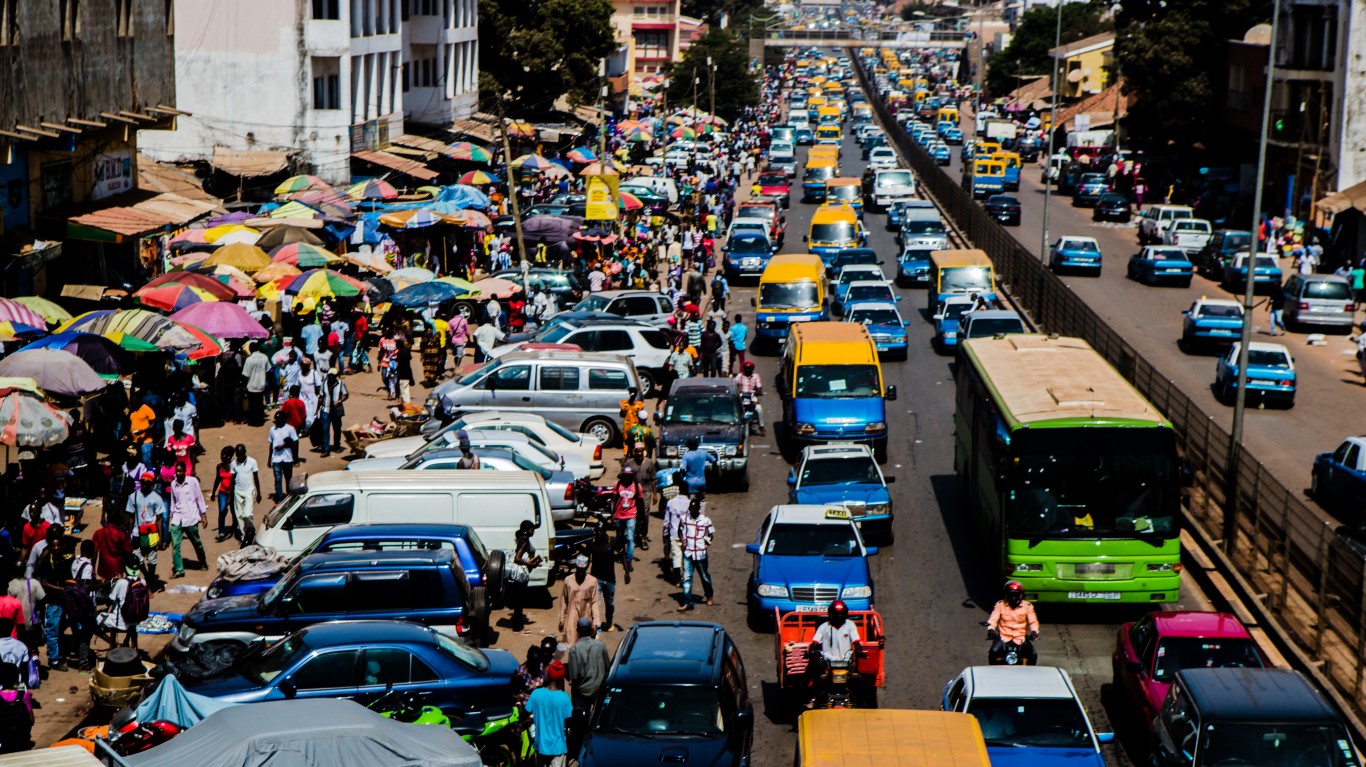
26. Guinea-Bissau
> Advisory level: Level 3: Reconsider Travel
> Last updated: April 25, 2019
> Population as of 2018: 1,874,309
> GDP per capita in 2018 $1,596
Guinea-Bissau, a small coastal nation in West Africa, is potentially dangerous for American visitors largely due to the prevalence of violent crime. Crowded areas, particularly the airport and markets in major cities, can be hotbeds for aggressive panhandling and criminal activity.
The country has also struggled with governmental dysfunction and political unrest for decades, creating fertile ground for violence. The United States does not have an embassy in the country, and as a result, emergency services for American citizens are limited.
[in-text-ad]
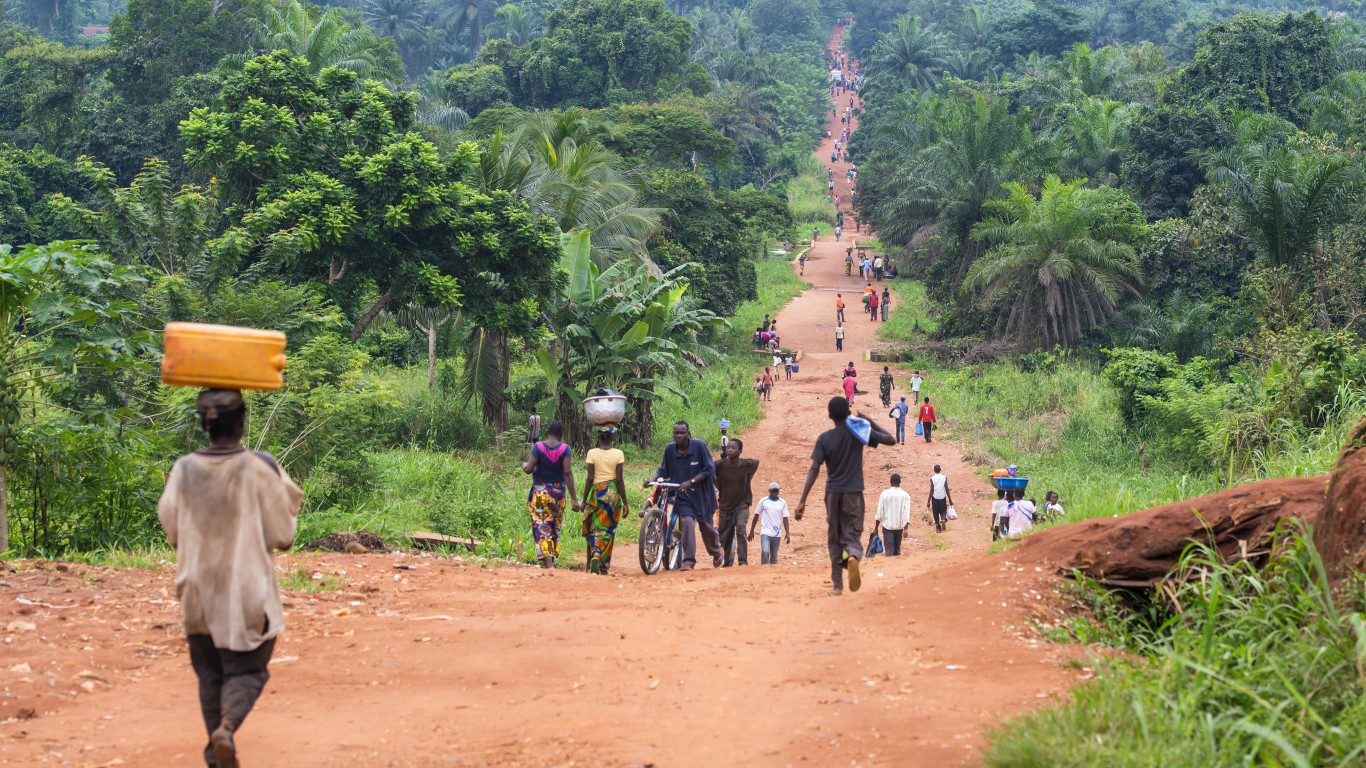
25. Democratic Republic of the Congo
> Advisory level: Level 3: Reconsider Travel
> Last updated: April 9, 2019
> Population as of 2018: 84,068,091
> GDP per capita in 2018 $827
The U.S. government has asked American citizens to reconsider traveling to the Democratic Republic of the Congo because of crime and civil unrest. Some areas have increased risk due to health concerns, including an outbreak of Ebola in the provinces of Nord-Kivu, Ituri — which have a level 4 do not travel advisory. As of Aug. 30, the death toll from the country’s latest Ebola outbreak had risen above 2,000.
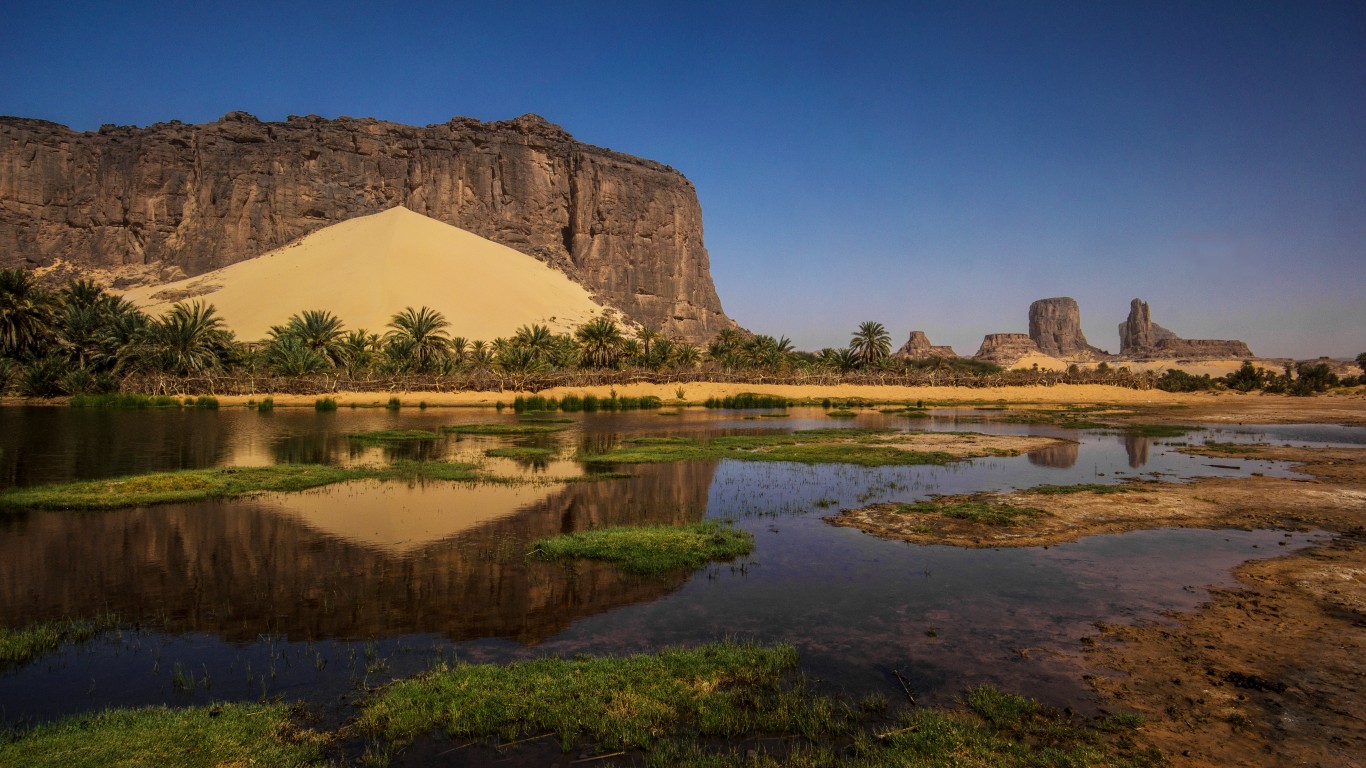
24. Chad
> Advisory level: Level 3: Reconsider Travel
> Last updated: Jan. 30, 2019
> Population as of 2018: 15,477,751
> GDP per capita in 2018 $1,746
Travelers need to be aware of crime, terrorism, and minefields in Chad. The State Department reported a surge in crimes in the African nation in 2018. Extremist groups such as Boko Haram and the Islamic State of Iraq and Ash-Sham âWest Africa can cross the border easily and target foreigners, security personnel, and other groups. Chad also has unmapped areas of minefields near the borders with Libya and Sudan.
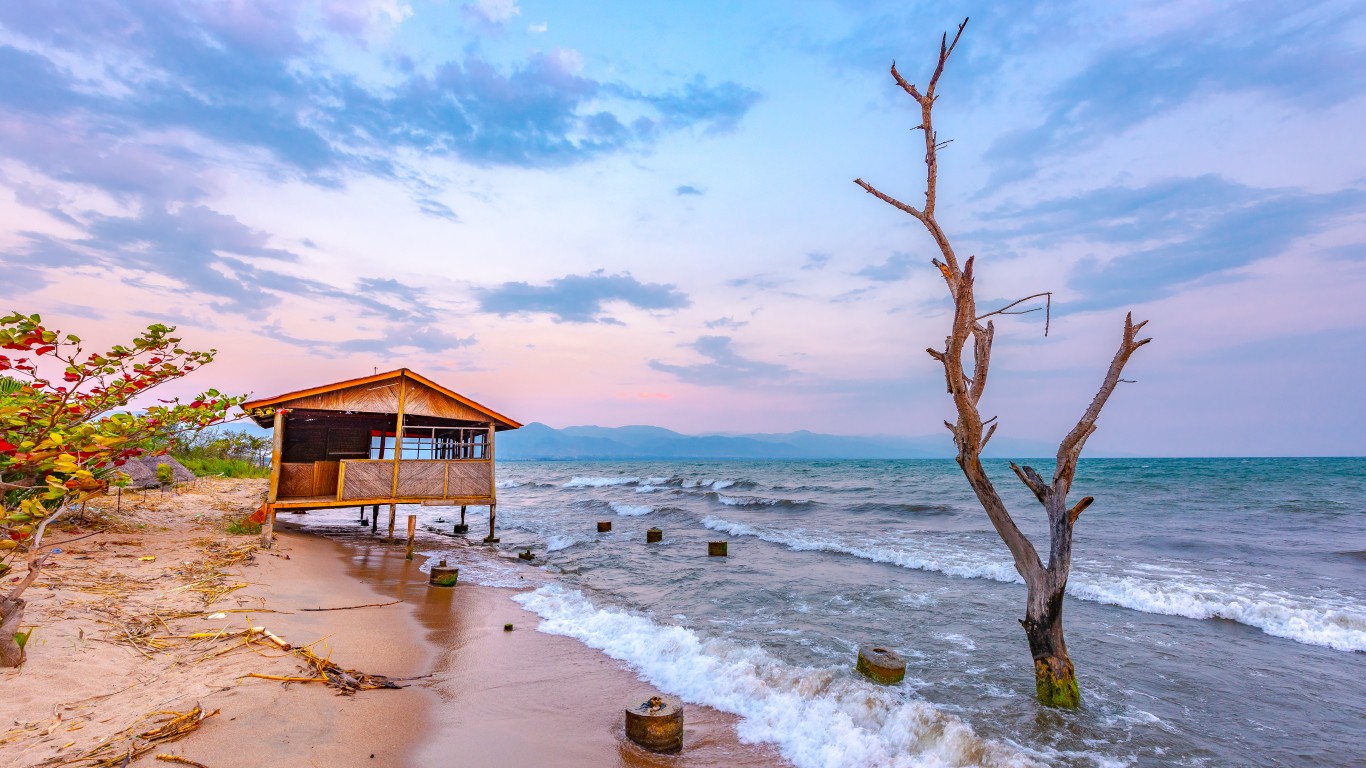
23. Burundi
> Advisory level: Level 3: Reconsider Travel
> Last updated: June 12, 2019
> Population as of 2018: 11,175,378
> GDP per capita in 2018 $660
Crime and political violence are relatively common in the Central African nation of Burundi — and local police are often ill-equipped to effectively respond to such incidents. The country lacks adequate medical and fire emergency services, and the U.S. government has limited ability to provide emergency services to Americans travelling in the country.
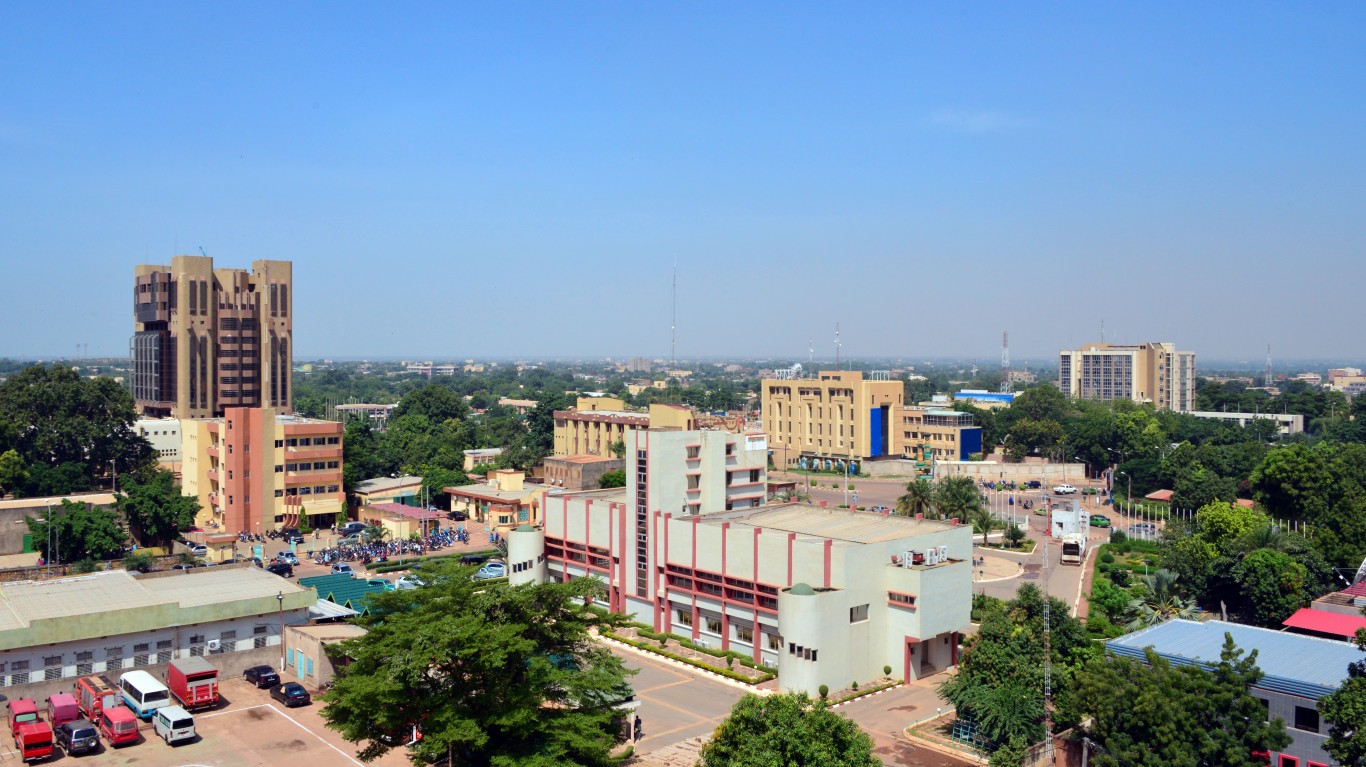
22. Burkina Faso
> Advisory level: Level 3: Reconsider Travel
> Last updated: June 3, 2019
> Population as of 2018: 19,751,535
> GDP per capita in 2018 $1,756
Travelers need to be wary of crime and kidnapping in Burkina Faso — and terrorism is a major concern there. The State Department advises Americans not to travel to regions surrounding the central part of the landlocked West African nation in particular.
To combat terrorism in Burkina Faso, the military launched counterterrorism operations in March and May of this year, targeting the northern and eastern regions of the country.
[in-text-ad]
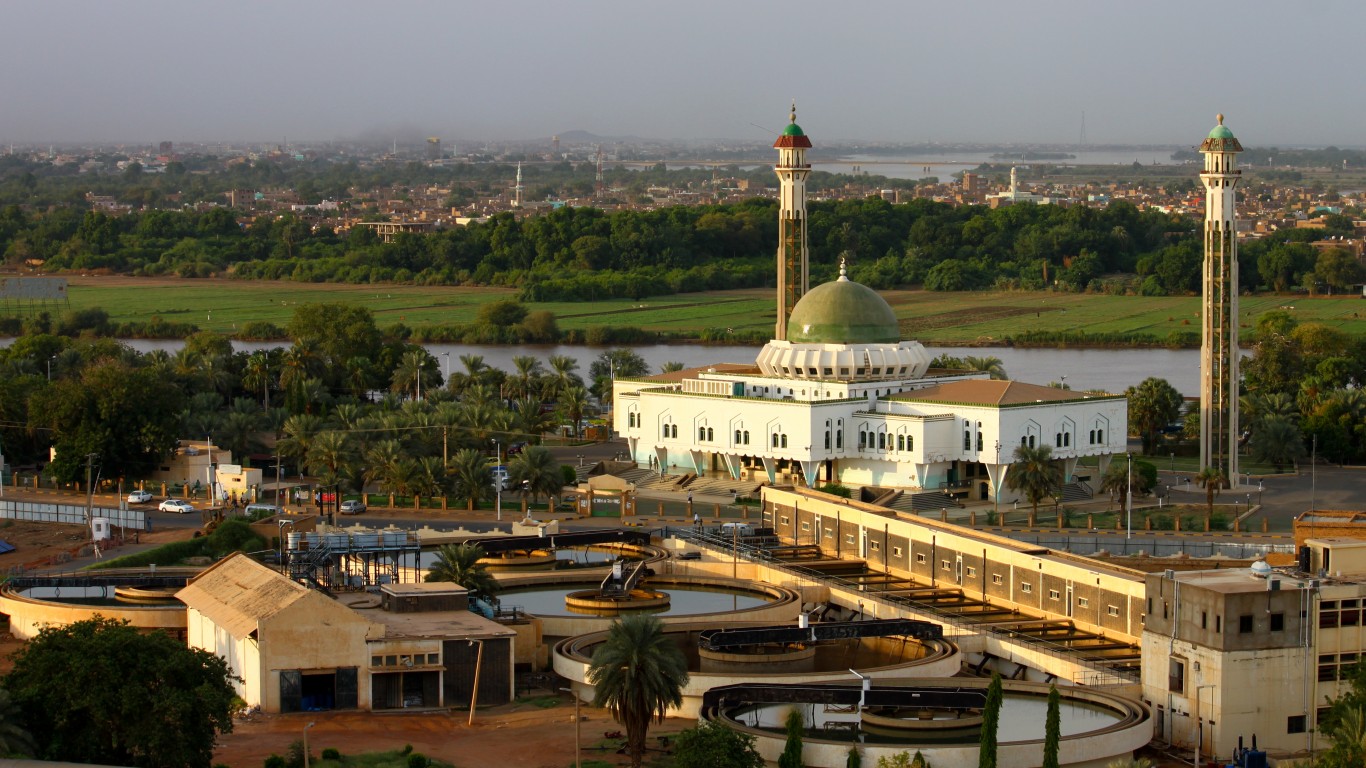
21. Sudan
> Advisory level: Level 3: Reconsider Travel
> Last updated: Sept. 26, 2019
> Population as of 2018: 41,801,533
> GDP per capita in 2017 $4,436
Violent crimes, including armed robbery, carjacking, and home invasions, happen relatively often in Sudan, particularly outside of the capital city of Khartoum. Terrorist groups operating in the country pose a threat and may target Westerners through kidnappings, shootings, and suicide bombings. American officials in the country are required to travel in armored vehicles when on official business.
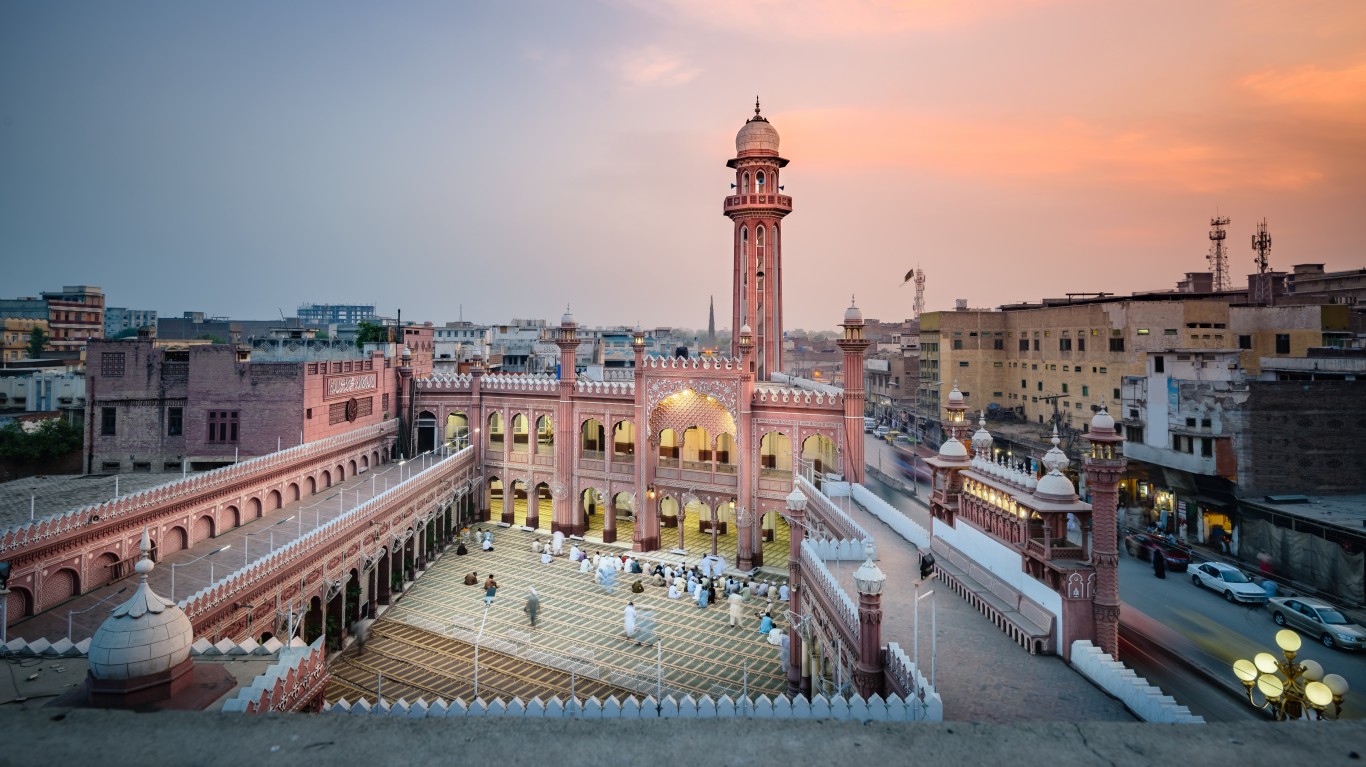
20. Pakistan
> Advisory level: Level 3: Reconsider Travel
> Last updated: April 9, 2019
> Population as of 2018: 212,215,030
> GDP per capita in 2018 $4,928
Pakistan remains a hotbed of terrorist activity, with the provinces Balochistan and Khyber Pakhtunkhwa — both of which are at level 4: do not travel — of primary concern for travelers. The Azad Kashmir area is also a potential region for violence. Tensions have risen in the India-administered region of Kashmir, which borders Azad Kashmir. Pakistan recently claimed that protesters in Kashmir were tortured and detained by the Indian army.
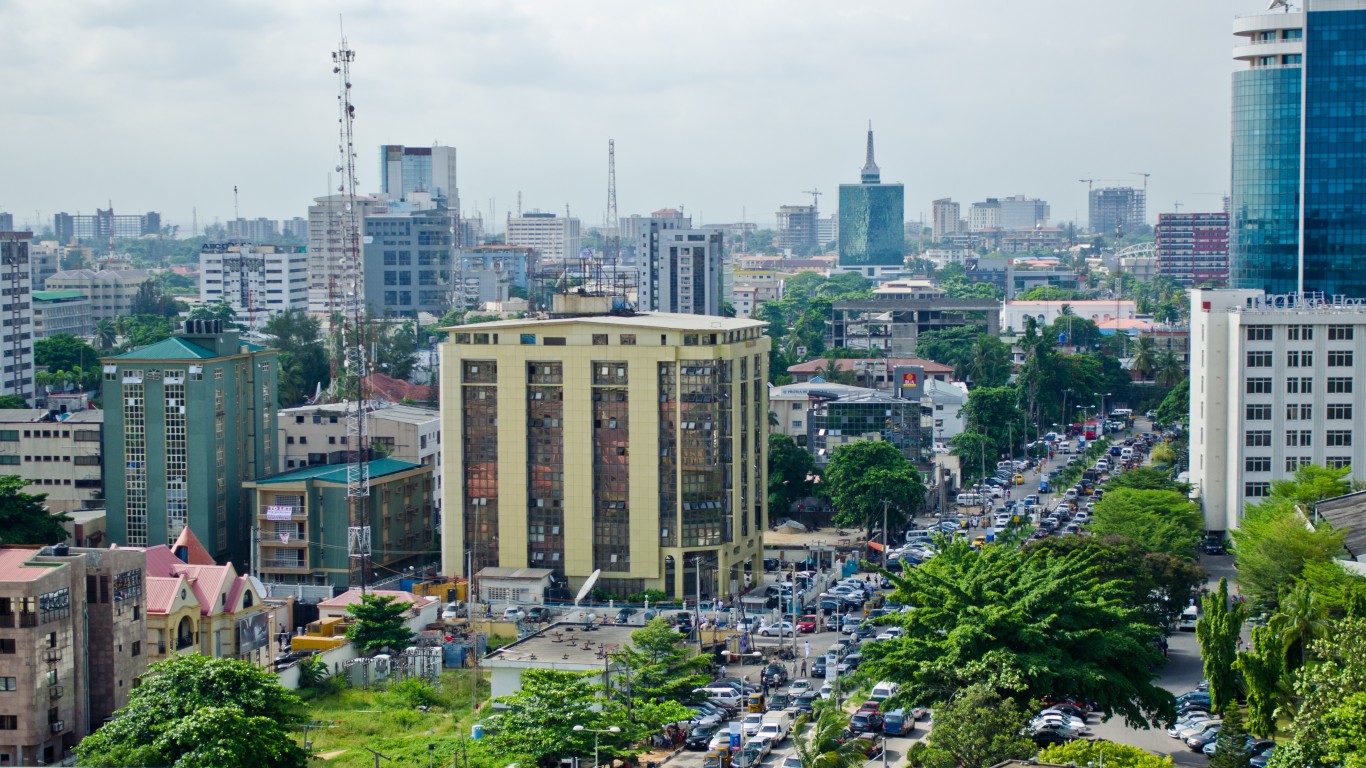
19. Nigeria
> Advisory level: Level 3: Reconsider Travel
> Last updated: April 9, 2019
> Population as of 2018: 195,874,740
> GDP per capita in 2018 $5,316
The threat of indiscriminate violent crime, including rape, robbery, and assault, is prevalent across much of Nigeria. Terrorsim is also a persistent threat, particularly in the northeastern part of the country, where terror groups target shopping centers, hotels, schools, government installations, and other places where crowds tend to congregate. The State Department advises Americans who choose to travel in the country to remain vigilant, avoid large political gatherings, and not to resist in the event of a robbery.
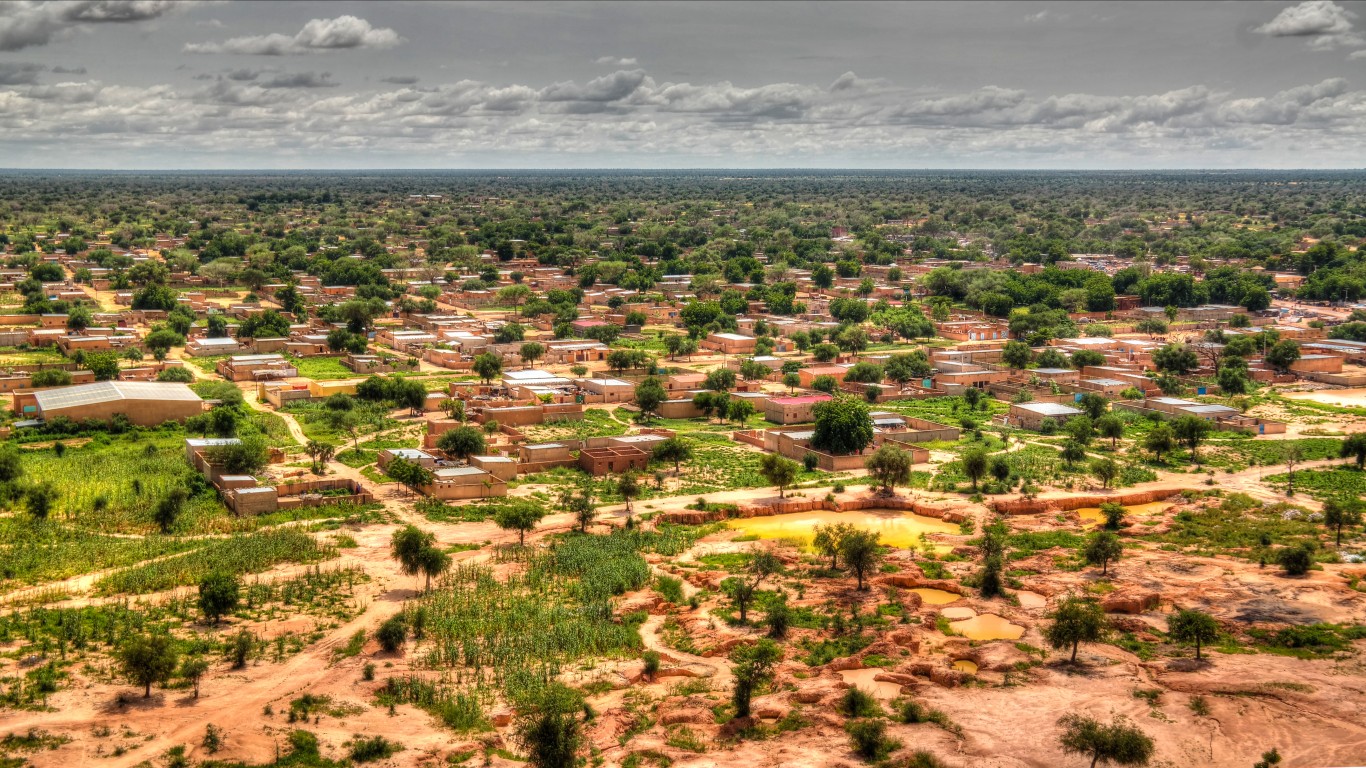
18. Niger
> Advisory level: Level 3: Reconsider Travel
> Last updated: April 9, 2019
> Population as of 2018: 22,442,948
> GDP per capita in 2018 $932
The landlocked West African country of Niger borders seven nations, and the State Department has asked Americans to reconsider travelling there because of crime, terrorism, and kidnapping. Terrorists are active in the bordering areas of Mali, Libya, Burkina Faso, and in the northern region of Niger. In the past, extremists based in Mali have crossed the border and attacked Niger’s security forces.
In May, Niger authorities said they thwarted a terrorist attack on a prison near the capital of Niamey.
[in-text-ad]
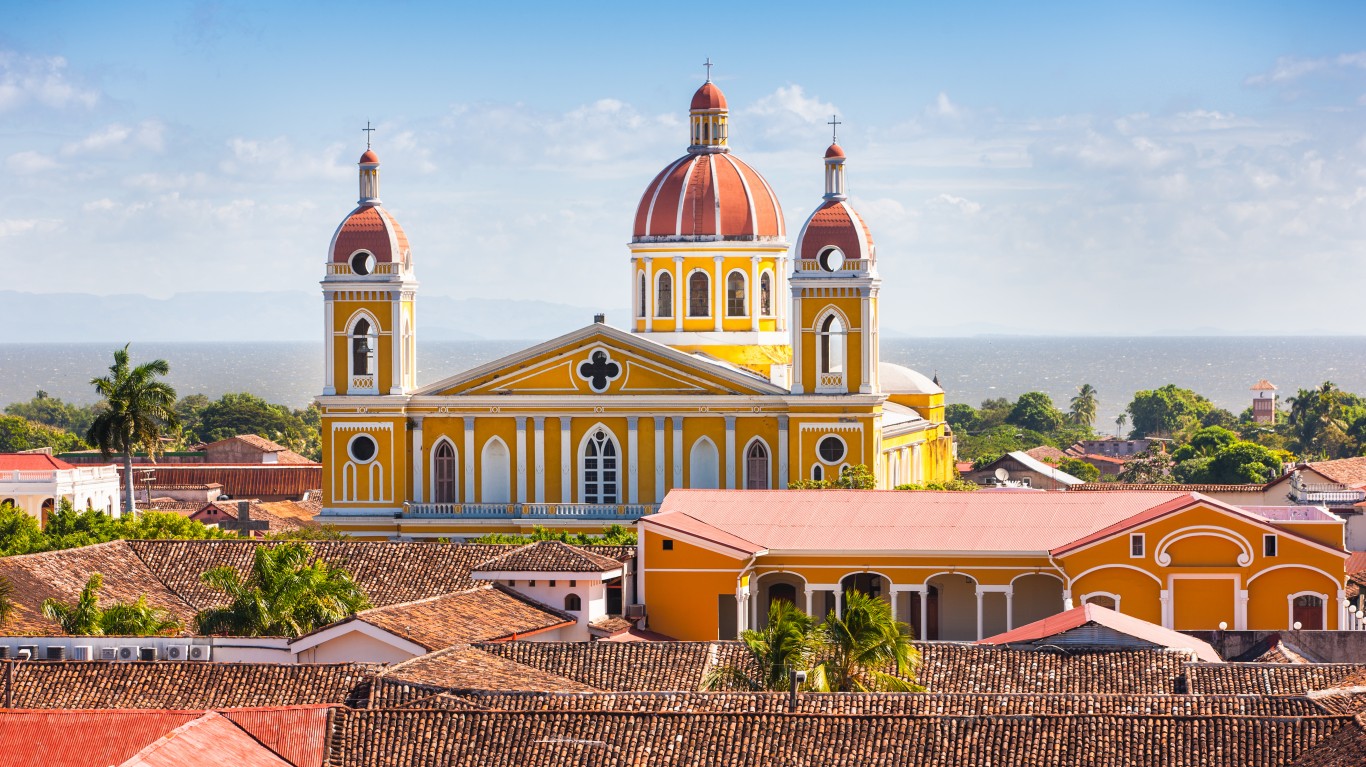
17. Nicaragua
> Advisory level: Level 3: Reconsider Travel
> Last updated: April 3, 2019
> Population as of 2018: 6,465,513
> GDP per capita in 2018 $4,910
Civil unrest and the general dissolution of law enforcement make Nicaragua a dangerous destination for American travellers. Both official police and armed civilians acting as police target anyone perceived to be in opposition to President Daniel Ortega. Pro-democracy protesters are arbitrarily detained by the government, and members of the press and human rights advocates are also regularly targeted. Violent crimes are also relatively common in the Latin American country.
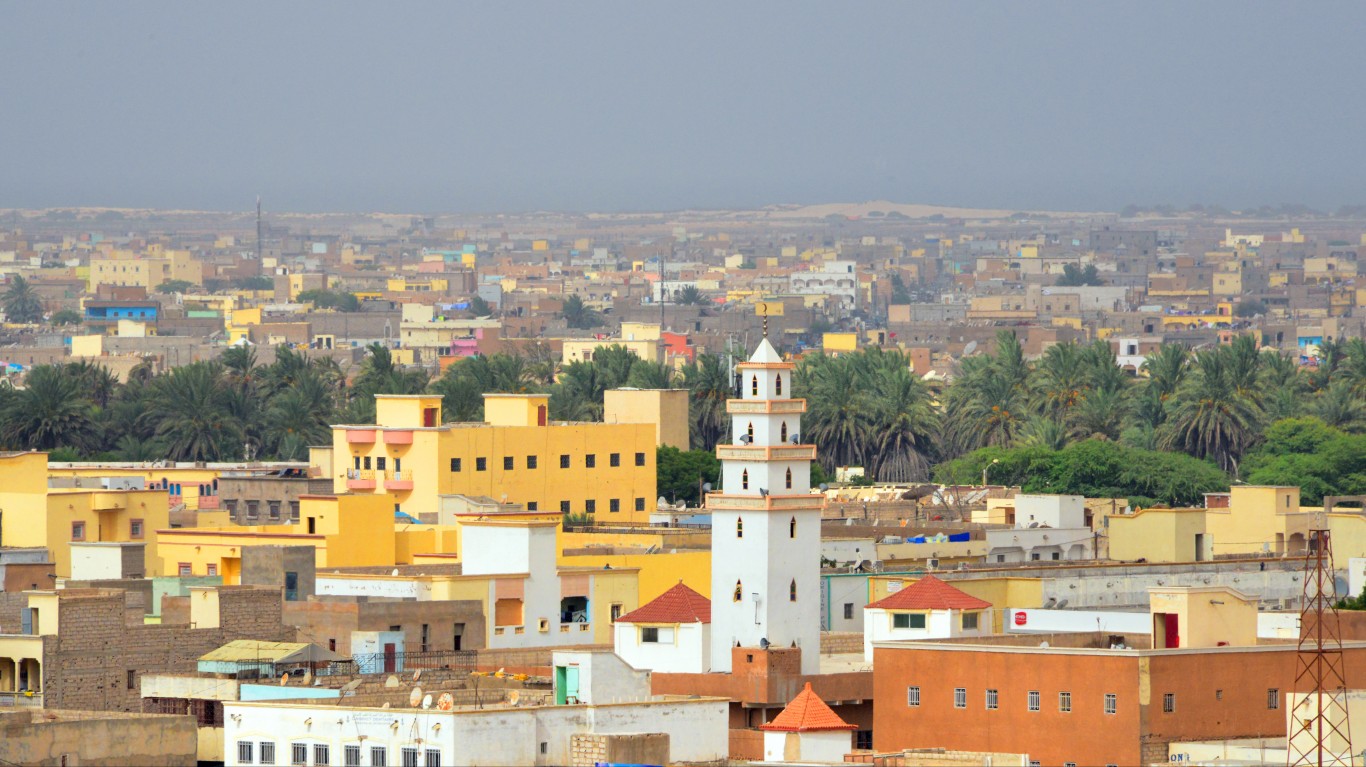
16. Mauritania
> Advisory level: Level 3: Reconsider Travel
> Last updated: Nov. 29, 2018
> Population as of 2018: 4,403,319
> GDP per capita in 2018 $3,724
Travelers are discouraged from journeying to the West African nation that borders the Atlantic Ocean because of crime and terrorism risks. In order to travel outside of the capital of Nouakchott, U.S. government employees have to obtain special authorization. American workers are only allowed to travel during daylight hours and are forbidden from walking alone outside of specific areas and times.
Mauritania has had a turbulent history since gaining independence from France in 1960 — it had five coups and has been led by military rulers for many years. In August, the country elected Mohamed Ould Ghazouani as president, and the nation completed its first peaceful transfer of power.
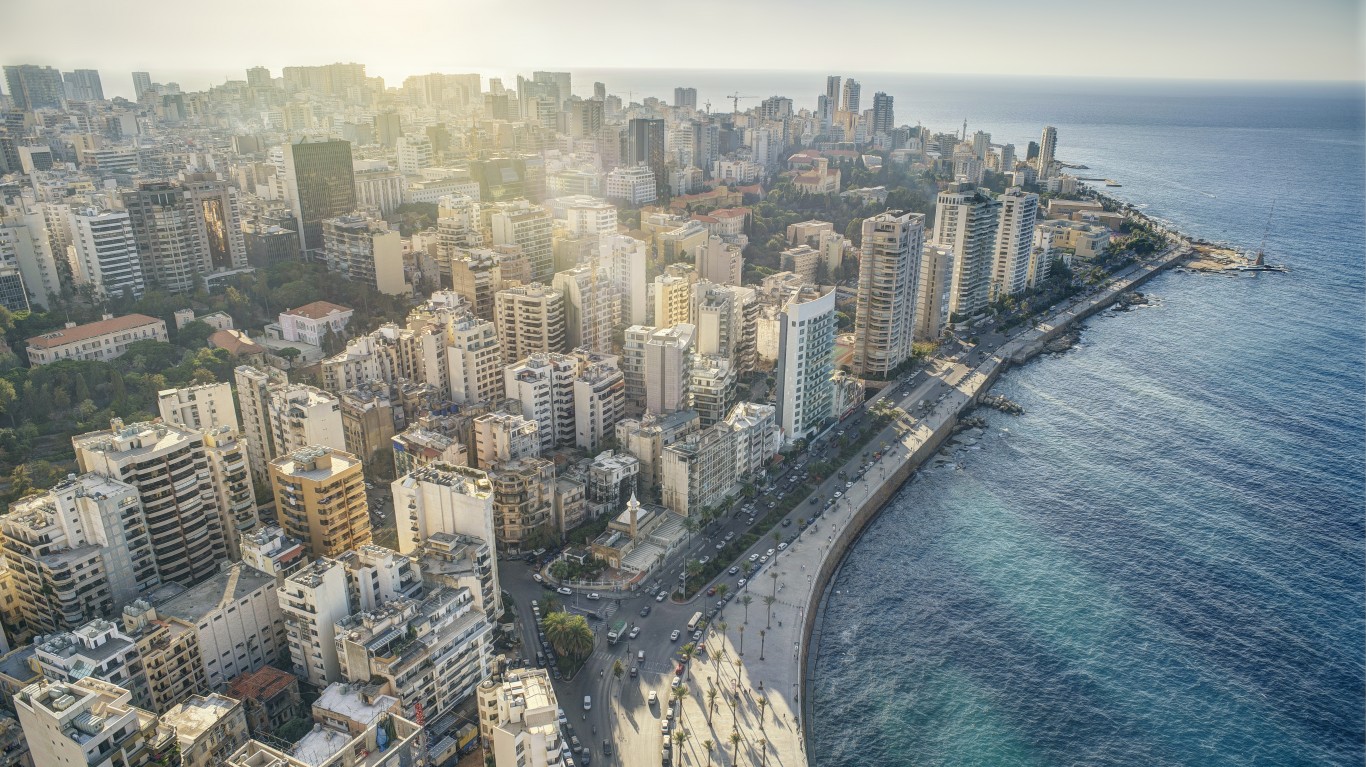
15. Lebanon
> Advisory level: Level 3: Reconsider Travel
> Last updated: April 9, 2019
> Population as of 2018: 6,848,925
> GDP per capita in 2018 $11,607
Lebanon, a country on the eastern shore of the Mediterranean Sea just north of Israel and bordering Syria to its east and north, is one of several Middle Eastern countries on this list. The perpetual threat of terroism is the primary reason for Lebanon’s level 3 advisory. Terror attacks are often carried out without warning and frequently target transportation hubs and tourist locations.
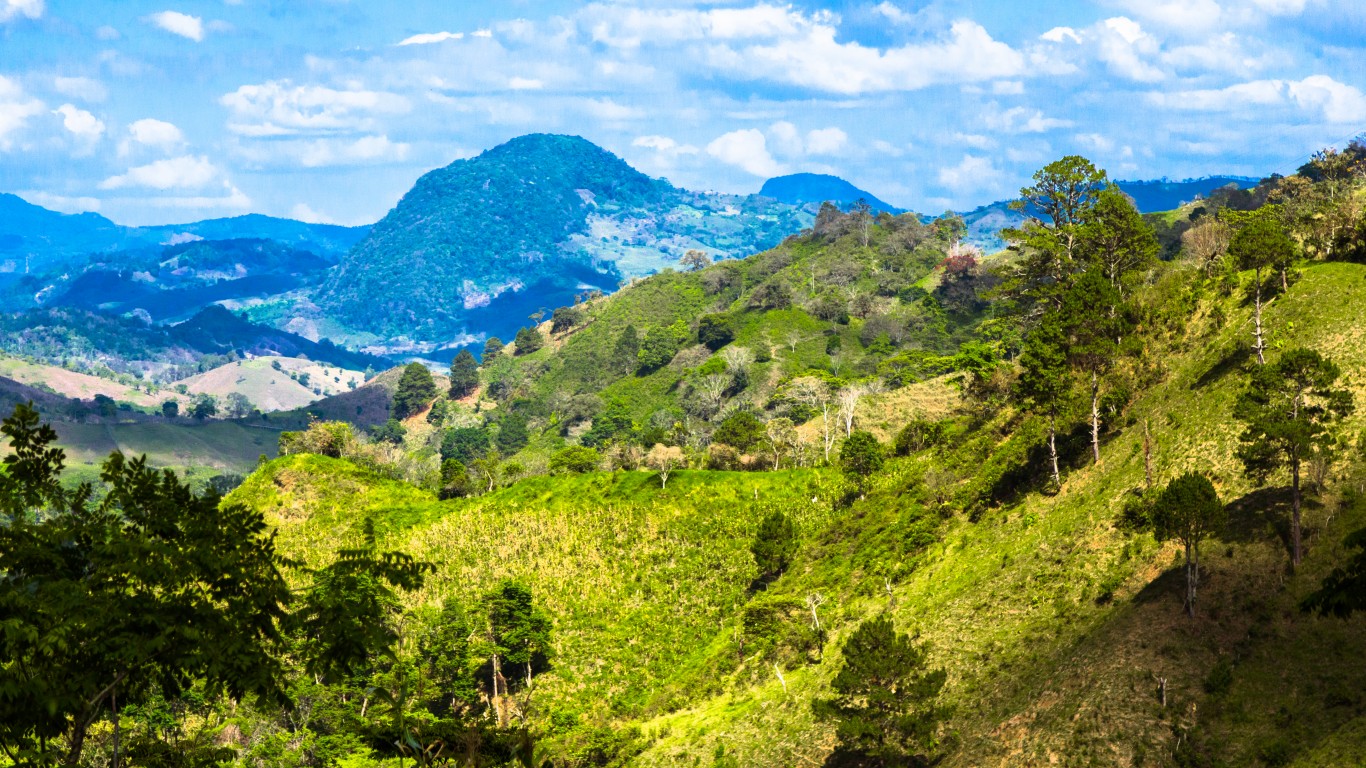
14. Honduras
> Advisory level: Level 3: Reconsider Travel
> Last updated: June 24, 2019
> Population as of 2018: 9,587,522
> GDP per capita in 2018 $4,560
Gang activity has increased crime in Honduras. Americans are advised to reconsider travel to the central American country because of elevated levels of extortion, violent street crime, rape, and narcotics and human trafficking. Those who travel to Honduras are advised to avoid demonstrations; not walk at night; be cautious around ATMs and public areas; and not publicly display wealth.
Violent gang activity has been one of the causes of migration from Honduras to the United States. Honduras had been one of the most violent countries in the world, but homicide rates have been declining in recent years.
[in-text-ad]
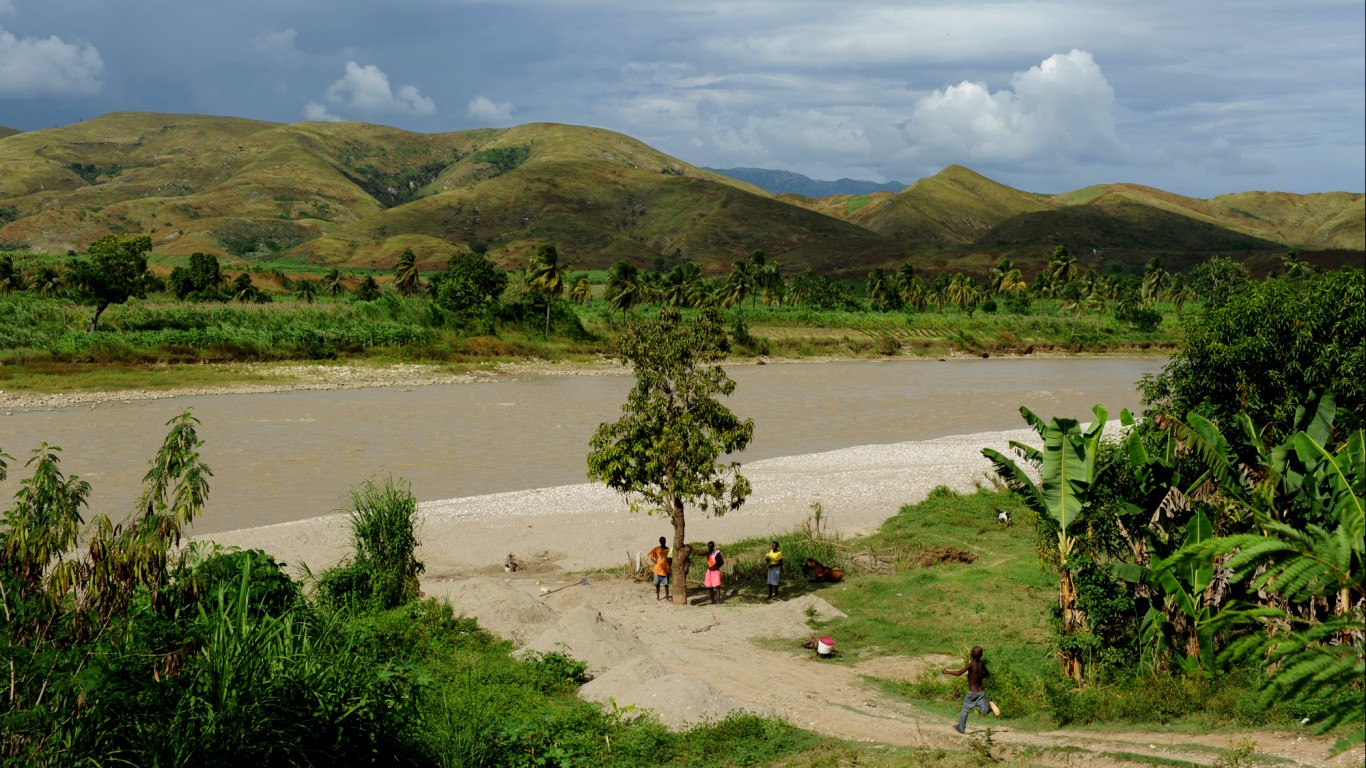
13. Haiti
> Advisory level: Level 3: Reconsider Travel
> Last updated: June 11, 2019
> Population as of 2018: 11,123,176
> GDP per capita in 2018 $1,656
Protests, road blockages, and tire burning along major roadways in Haiti can cause unpredictable delays. Violent crime in the country is also relatively common, and the ability for police and emergency services to adequately respond is limited. Tourists are frequently targeted for robbery in and around the capital Port-au-Prince airport.
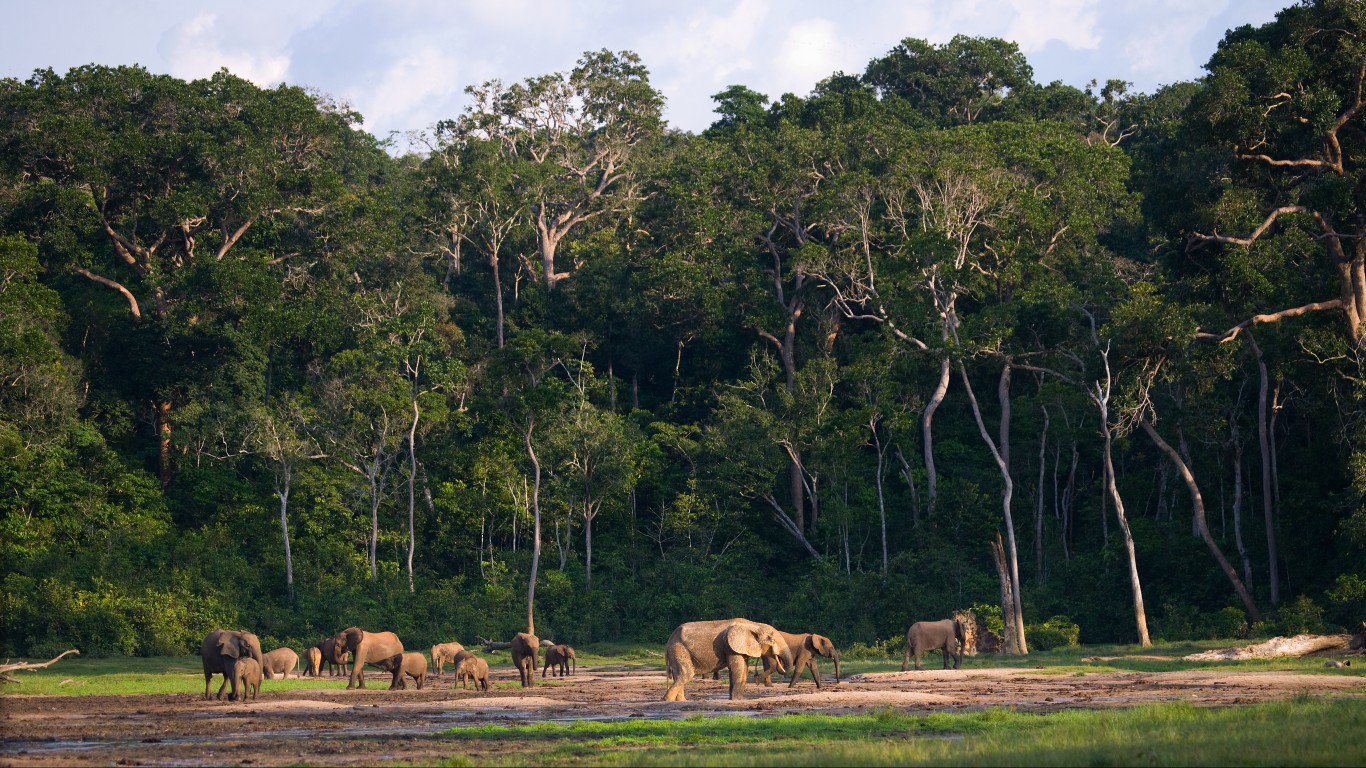
12. Central African Republic
> Advisory level: Level 4: Do Not Travel
> Last updated: April 9, 2019
> Population as of 2018: 4,666,377
> GDP per capita in 2018 $775
The Central African Republic has a level 4 warning, meaning the State Department recommends Americans do not travel there. Central African Republic has been embroiled in unrest that has uprooted thousands of people since a Muslim rebel group took control of the country in 2013. The United Nations peacekeeping mission has been in the landlocked African nation since 2014.
Violent crime is a daily reality in the country, where areas are controlled by armed groups that kidnap and injure people. American government workers need special authorization to go outside the Embassy compound.
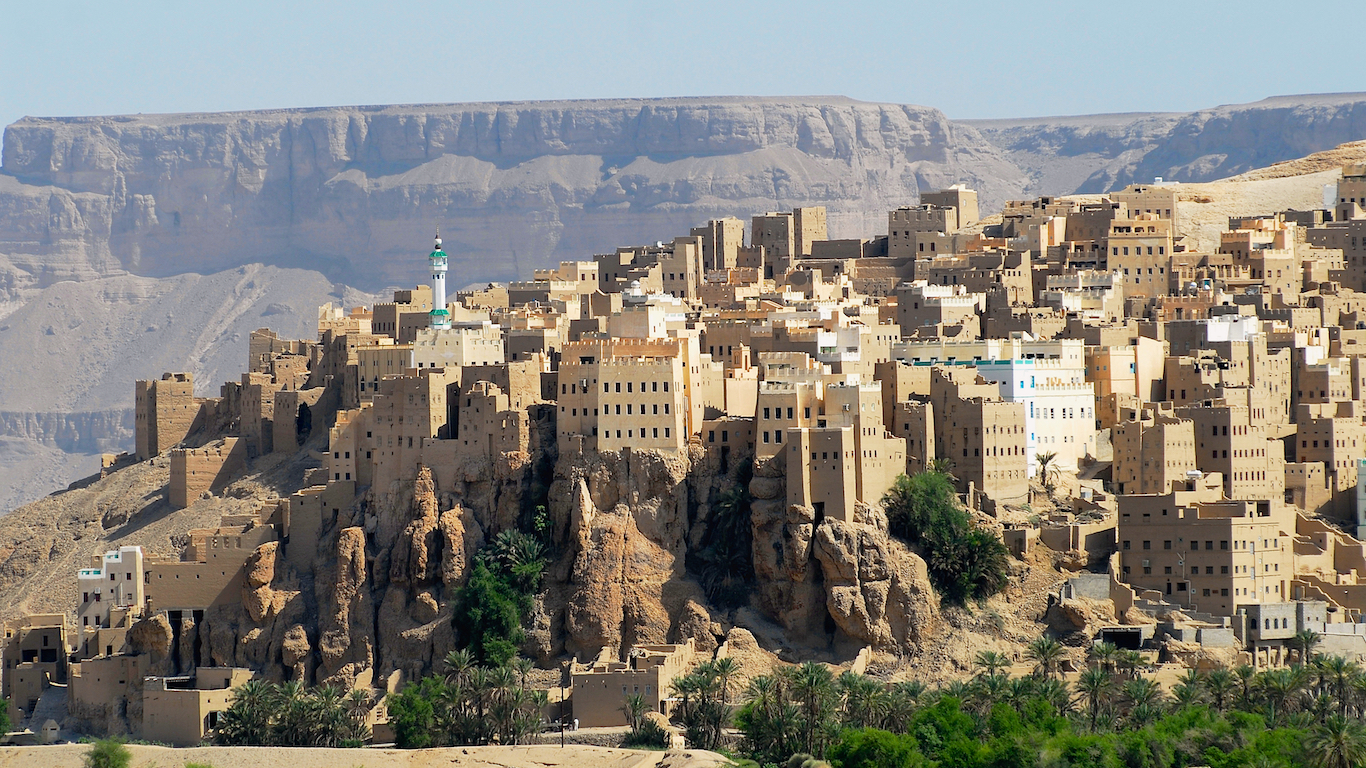
11. Yemen, Rep.
> Advisory level: Level 4: Do Not Travel
> Last updated: April 9, 2019
> Population as of 2018: 28,498,687
> GDP per capita in 2018 $2,285
Yemen is one of only a dozen countries worldwide for which the State Department has a standing level 4 travel warning. This highest level of warning is due largely to the ongoing civil war in the country, which has destroyed essential infrastructure and jeopardized supplies of food, water, and medicine. As in other Middle Eastern countries on this list, terrorism is also a persistent threat in Yemen.
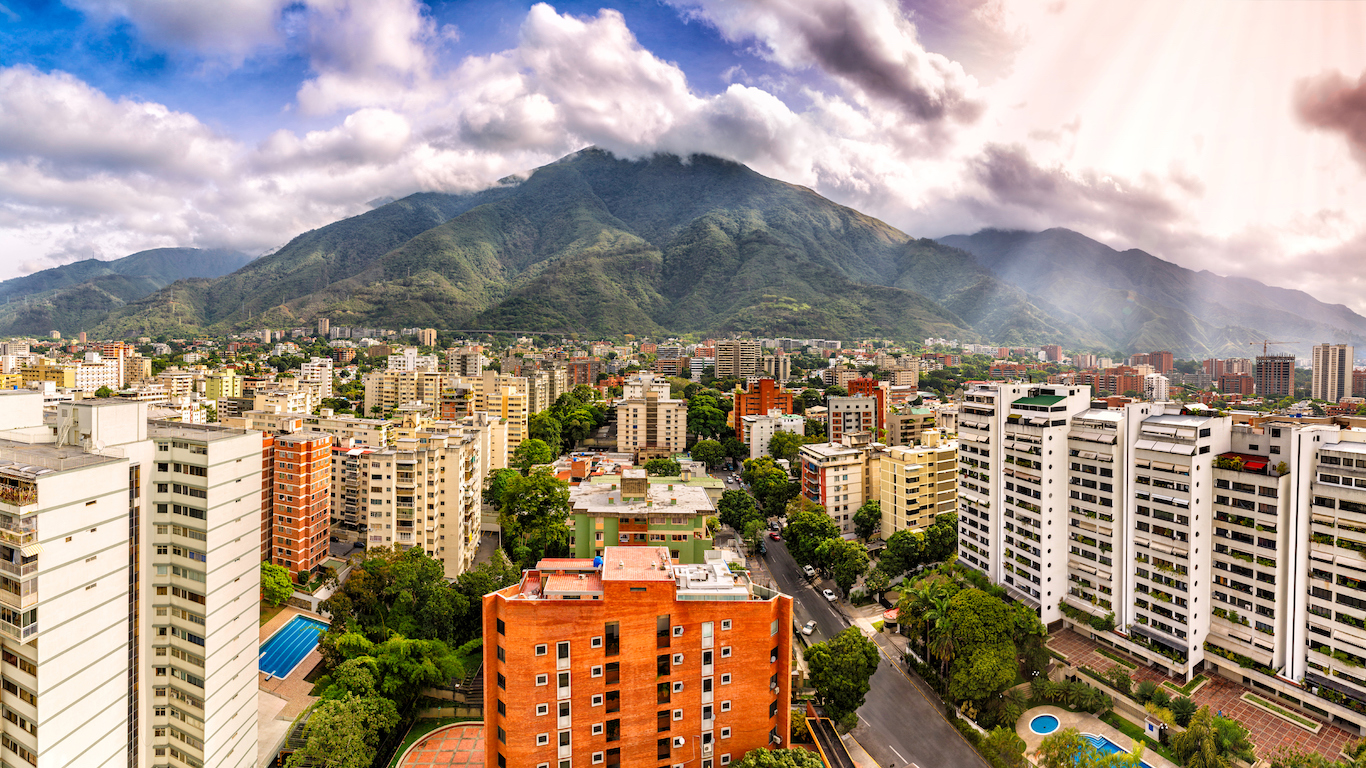
10. Venezuela, RB
> Advisory level: Level 4: Do Not Travel
> Last updated: April 9, 2019
> Population as of 2018: 28,870,195
> GDP per capita in 2014 $17,131
Turmoil continues to roil Venezuela — one of 12 countries with a level 4 warning. The South American nation is racked with crime and civil unrest. American citizens may be subject to arbitrary arrest and detention. The Centers for Disease Control and Prevention (CDC) also issued an avoid-nonessential-travel notice for Venezuela in May 2018 because of the breakdown of the medical infrastructure in that country. Since January, President Nicolás Maduro has been locked in a power struggle with opposition leader Juan Guaidó.
[in-text-ad]
9. Syrian Arab Republic
> Advisory level: Level 4: Do Not Travel
> Last updated: April 9, 2019
> Population as of 2018: 16,906,283
> GDP per capita: N/A
Plagued with armed conflict and civil strife, Syria is one of the most dangerous countries in the world and one of only 12 with a level 4 travel warning from the State Department. The country has been in a civil war — which has involved aerial bombings and use of chemical weapons — since 2011. The United States closed its embassy in Damascus in early 2012.
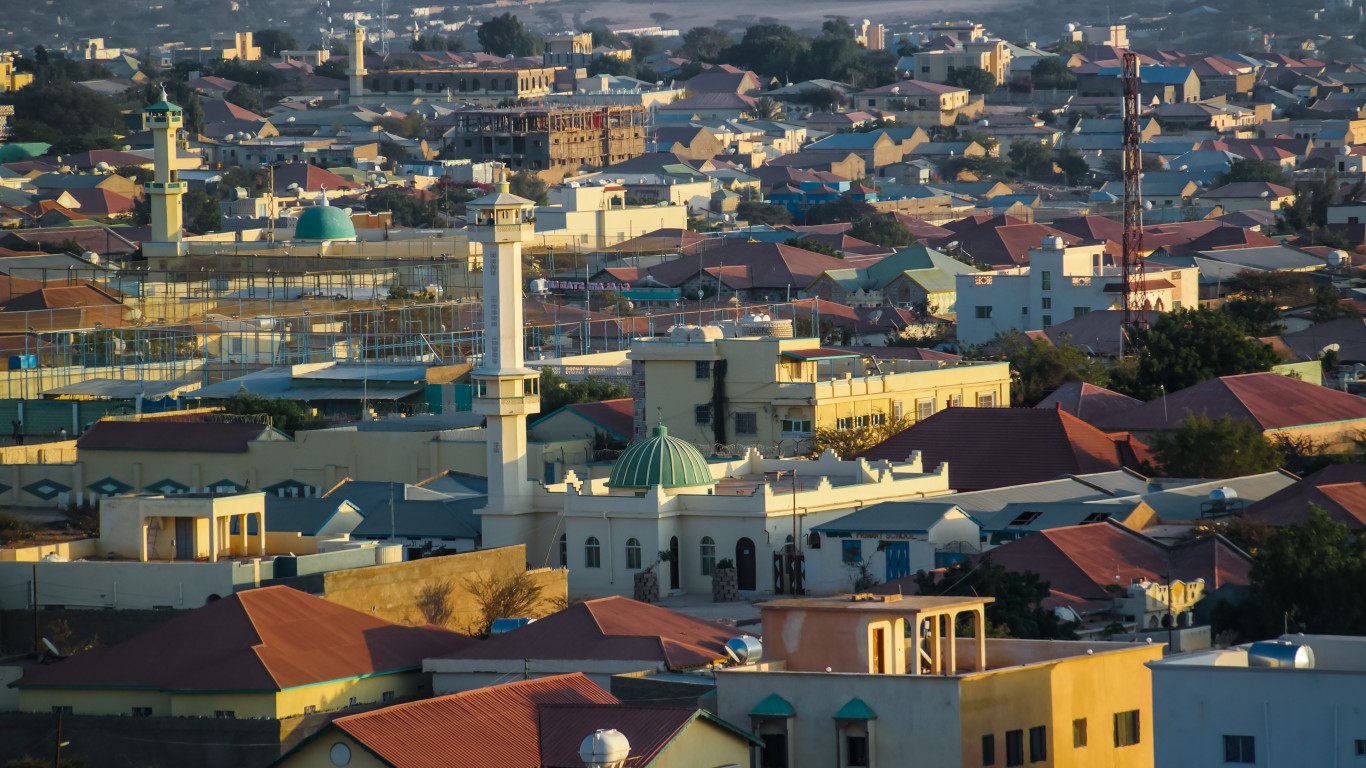
8. Somalia
> Advisory level: Level 4: Do Not Travel
> Last updated: April 9, 2019
> Population as of 2018: 15,008,154
> GDP per capita: N/A
After the overthrow of the government in 1991, Somalia has descended into anarchy and has become a haven for terrorists and pirates. Kidnapping and murder occur often in the nation on the eastern coast of Africa. The United States’ ability to provide services to American citizens in Somalia is constrained because of the lack of a permanent envoy there.
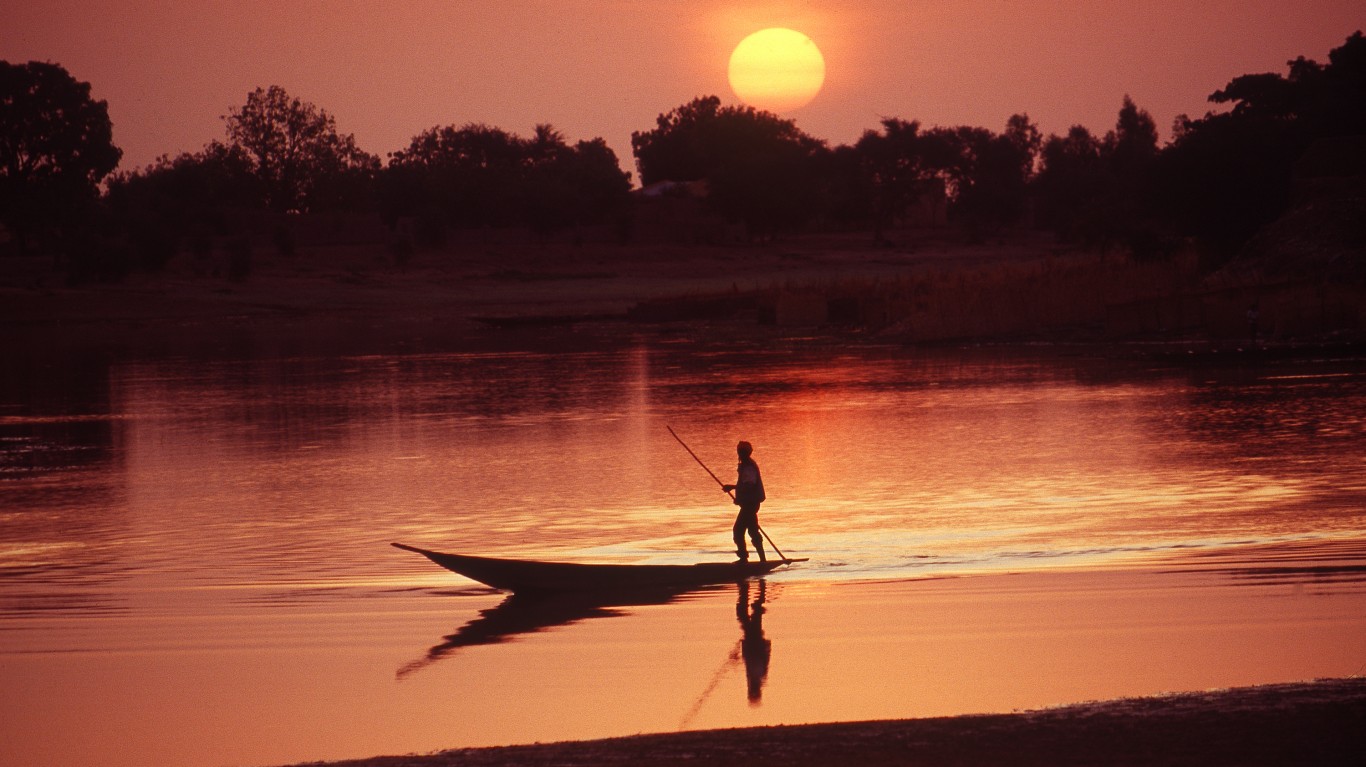
7. Mali
> Advisory level: Level 4: Do Not Travel
> Last updated: April 9, 2019
> Population as of 2018: 19,077,690
> GDP per capita in 2018 $2,056
Mali, a large landlocked country in West Africa, is one of only 12 nations worldwide with a level 4 travel warning from the U.S. State Department. In northern and central Mali, violent crimes like kidnapping and armed robbery are common. Terror groups frequently plot attacks in the country, targeting areas frequented by foreigners, such as night clubs, hotels, and restaurants.
The State Department encourages those who travel to the country to draft a will before their trip and to appoint a single family member to serve as a point of contact for potential hostage takers.
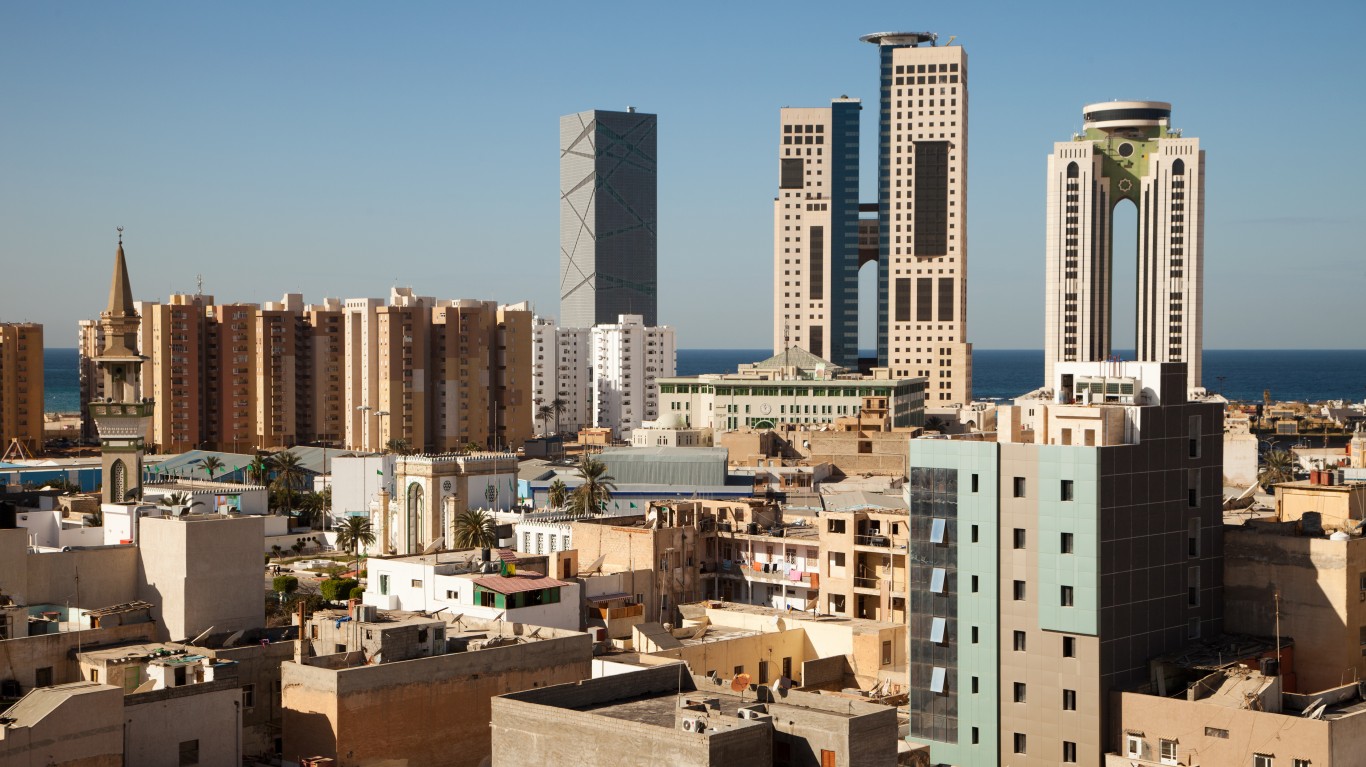
6. Libya
> Advisory level: Level 4: Do Not Travel
> Last updated: April 9, 2019
> Population as of 2018: 6,678,567
> GDP per capita in 2018 $18,406
Libya has become an unstable country since strongman Col. Muammar Gaddafi was overthrown and killed in 2011. The U.S. government advises Americans not to travel to the North African nation, which is racked by crime, terrorism, civil unrest, kidnapping, and armed conflict. Fighting among armed groups has occurred in the capital Tripoli, as well as the cities of Surman, Al-Jufra, Misrata, Ajdabiya, Benghazi, Sabha, and Dernah.
The United States’ ability to provide services to American citizens in Libya is limited because the U.S. embassy in Tripoli suspended operations in July 2014.
[in-text-ad]
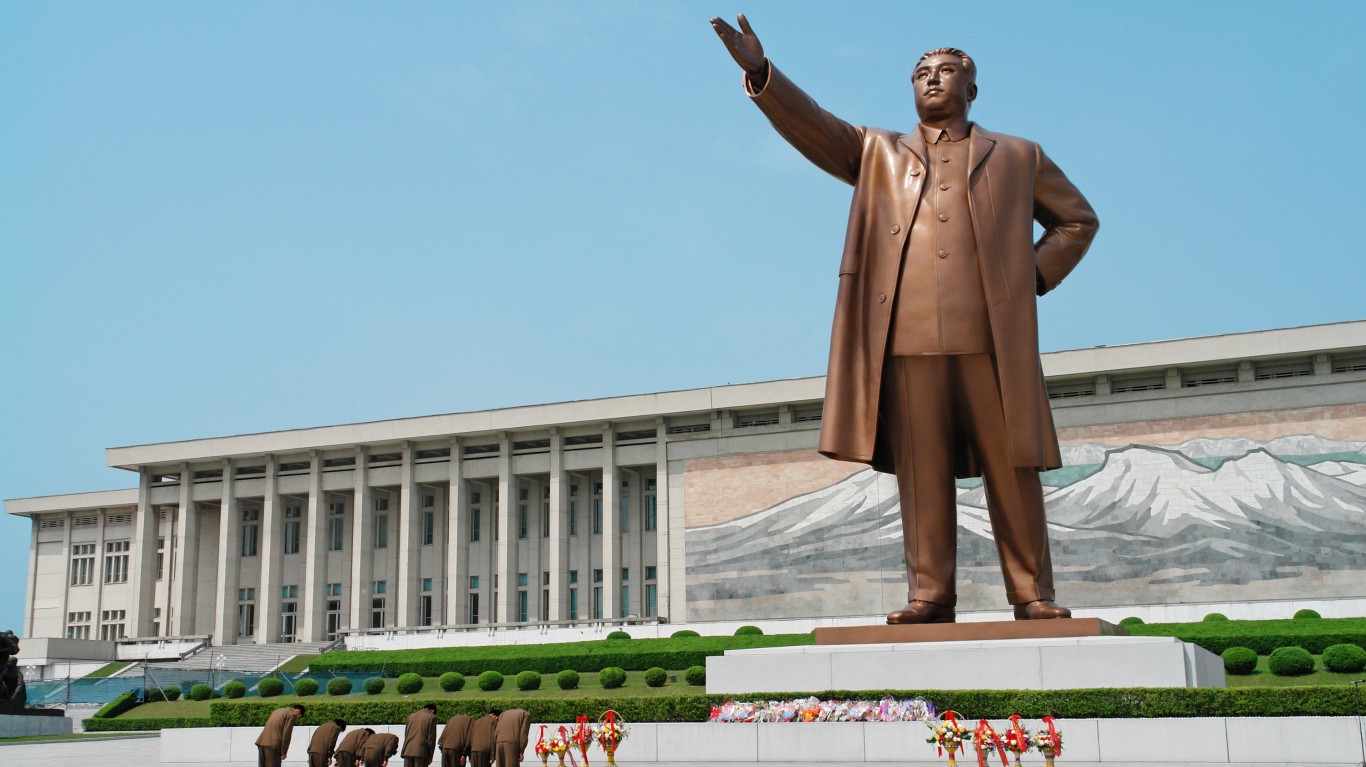
5. Democratic People’s Republic of Korea
> Advisory level: Level 4: Do Not Travel
> Last updated: July 10, 2019
> Population as of 2018: 25,549,819
> GDP per capita: N/A
Americans can only use their passports to travel to North Korea if they received a specially obtained validation from the State Department. Americans who still travel to the authoritarian pariah state risk arbitrary arrest and long-term detention. The U.S. government does not have diplomatic relations with North Korea and is unable to provide emergency services within the country.
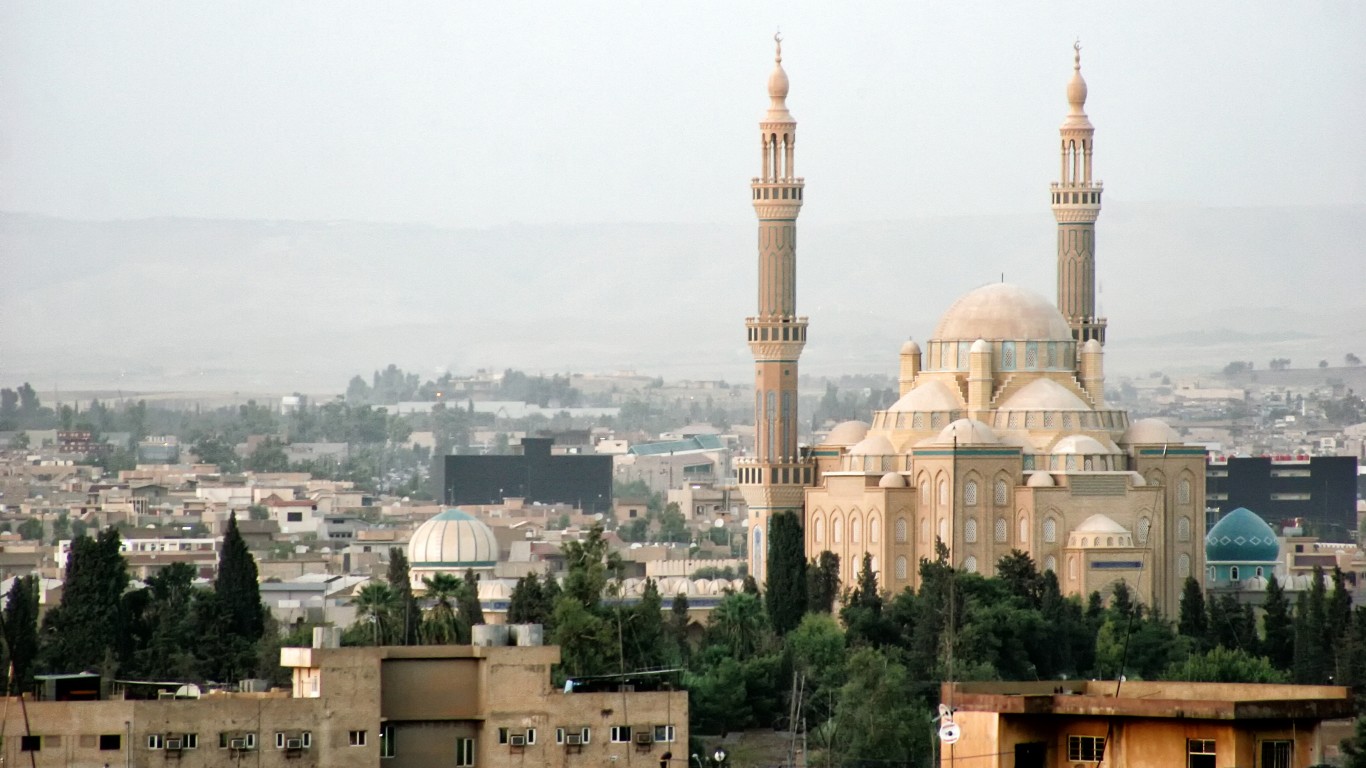
4. Iraq
> Advisory level: Level 4: Do Not Travel
> Last updated: May 15, 2019
> Population as of 2018: 38,433,600
> GDP per capita in 2018 $15,565
The State Department warns Americans not to travel to Iraq over concerns of terrorism, armed conflict, and kidnapping. Terrorist groups and militias continue to operate in the western Asian country, more than 16 years after the United States invaded Iraq. Terrorist groups and sectarian militias often target American citizens as well as Western companies.
In May, the State Department ordered non-emergency U.S. government personnel in Iraq to leave the country amid potential threats tied to rising tensions with Iran.
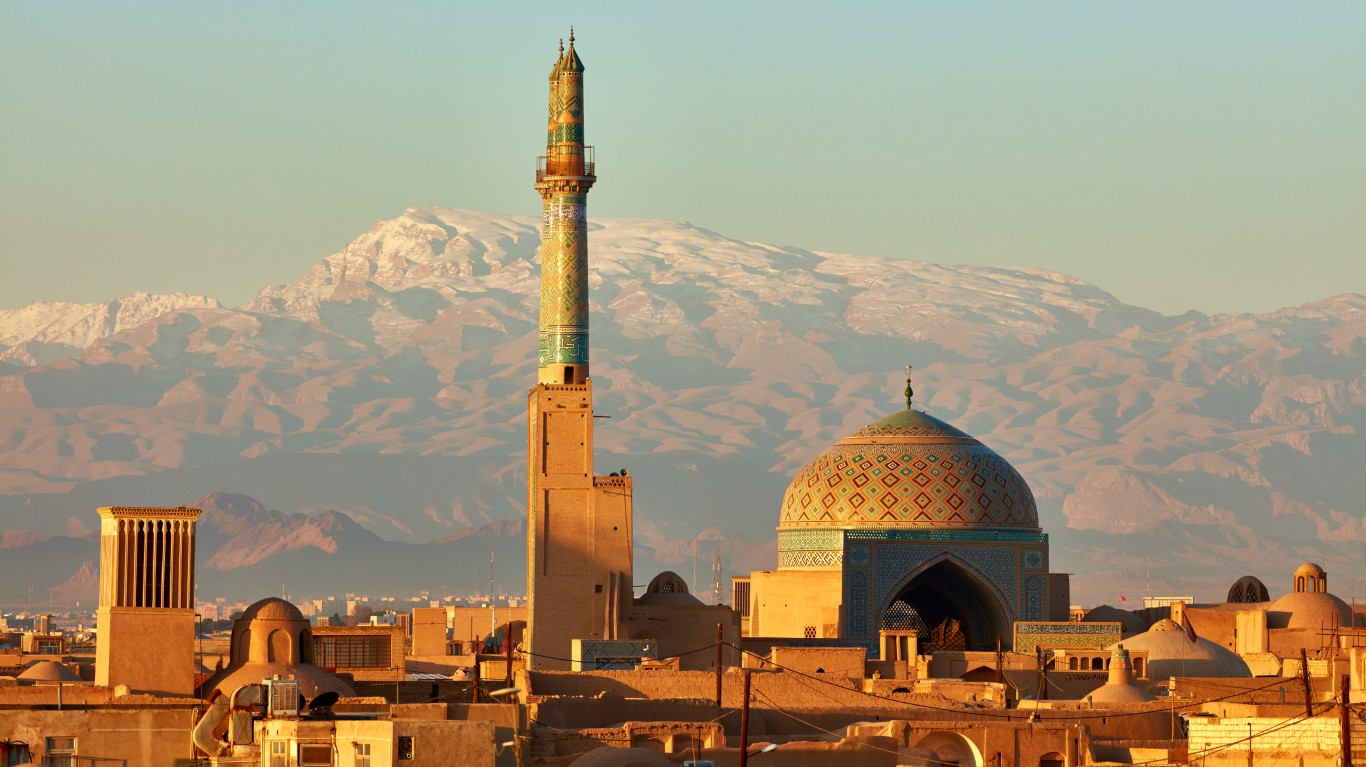
3. Islamic Republic of Iran
> Advisory level: Level 4: Do Not Travel
> Last updated: April 9, 2019
> Population as of 2018: 81,800,269
> GDP per capita in 2017 $19,098
Iranian authorities regularly detain and imprison Americans, particularly those with dual citizenship, under espionage charges. They often target students, journalists, and business travelers. The United States does not have diplomatic relations with Iran and cannot provide emergency services for Americans in the country.
[in-text-ad]
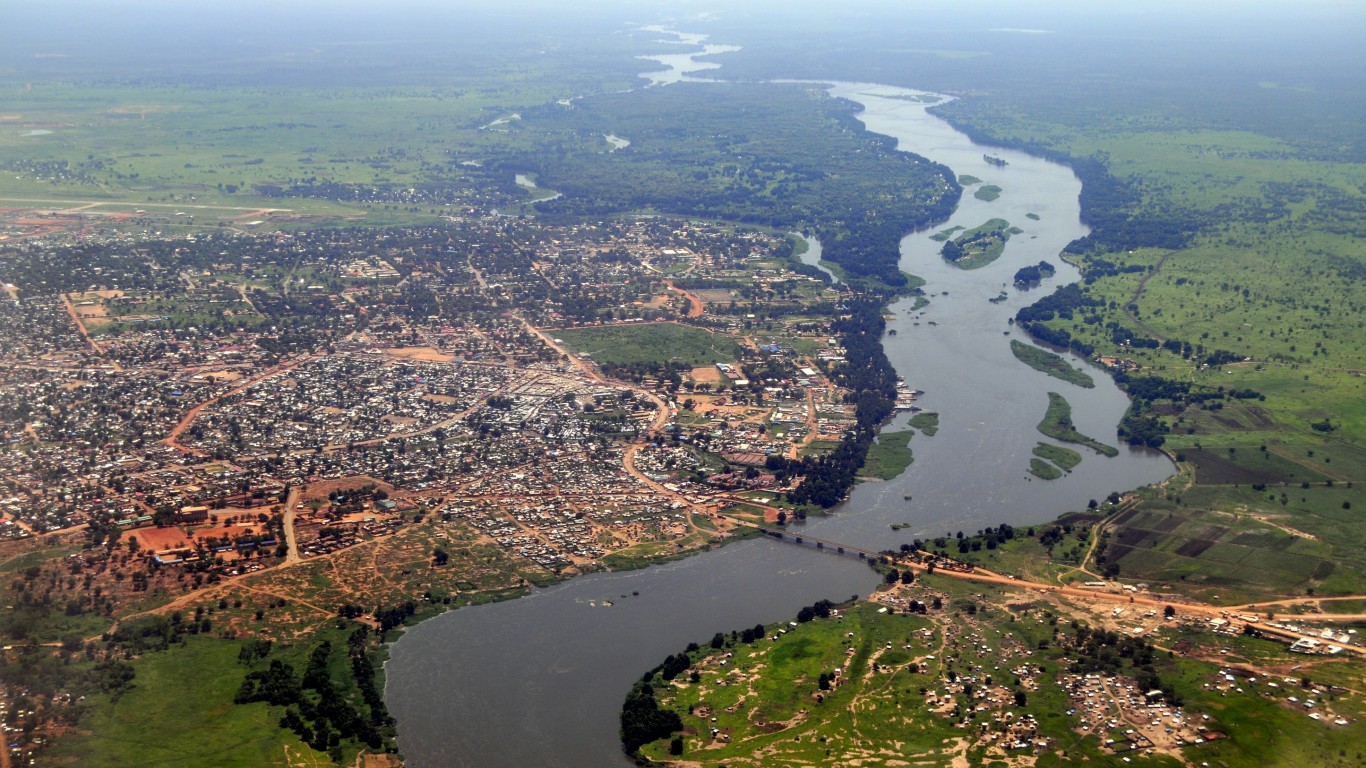
2. South Sudan
> Advisory level: Level 4: Do Not Travel
> Last updated: April 9, 2019
> Population as of 2018: 10,975,920
> GDP per capita in 2016 $1,678
South Sudan, one of the world’s newest nations, has been in turmoil since it was created in 2011. Americans are not advised to travel to South Sudan because of crime, kidnapping, and armed conflict. Extreme caution has been issued to U.S. government personnel in South Sudan’s capital of Juba. Americans who are government employees have to ride in armored vehicles to journey out of the city, and official movements outside the city are limited.
Corruption is a problem in South Sudan as well. A report in September from the Sentry, an investigative arm of the nonprofit group Enough Project, said foreign elites and warlords have plundered resources from South Sudan, one of the world’s poorest nations.
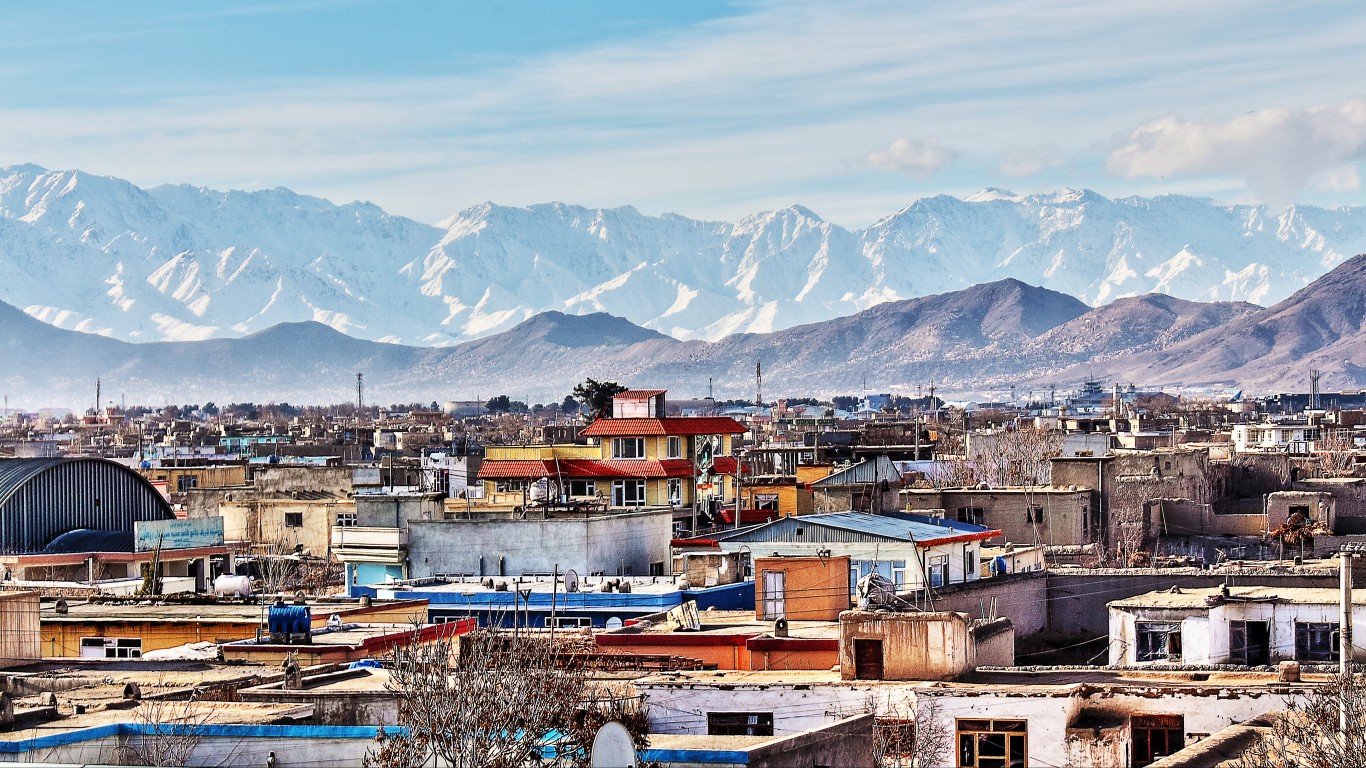
1. Afghanistan
> Advisory level: Level 4: Do Not Travel
> Last updated: April 9, 2019
> Population as of 2018: 37,172,386
> GDP per capita in 2018 $1,735
Afghanistan is one of a dozen countries to receive a level 4 travel warning from the State Department due to ongoing military conflict. Kidnappings, hostage taking, and suicide bombings are all relatively common throughout the country. Terrorist groups are active in Afghanistan and often target restaurants, hotels, airports, and government buildings. The State Department advises American visitors to the country to draft a will prior to the start of their trip.
Want retirement to come a few years earlier than you’d planned? Or are you ready to retire now, but want an extra set of eyes on your finances?
Now you can speak with up to 3 financial experts in your area for FREE. By simply clicking here you can begin to match with financial professionals who can help you build your plan to retire early. And the best part? The first conversation with them is free.
Click here to match with up to 3 financial pros who would be excited to help you make financial decisions.
Thank you for reading! Have some feedback for us?
Contact the 24/7 Wall St. editorial team.